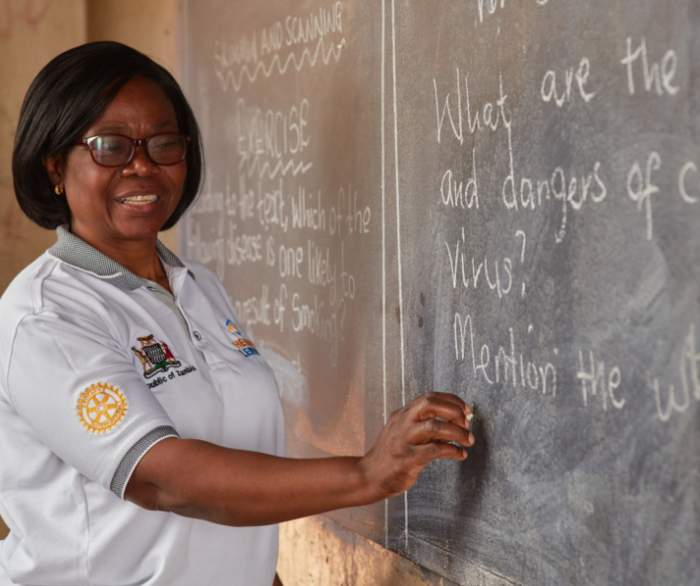THINKMD
MLC Vanguard | Created by THINKMD
THINKMD’s clinical assessment platform puts advanced clinical logic into the hands of any health worker, regardless of their level of training. It increases a user's adherence to recommended protocols and clinical assessment accuracy that continually improves disease algorithms with geo-tagged health and epidemiological data. Listed in the WHO's compendium of Innovative Technologies for Low Resource Settings, it provides clinical and triage recommendations that correlate 85-95% to that of a physician. Treatment is automatically calculated based on the age and weight of the patient or can be configured to referral-only mode depending on the type of user and local Ministry guidelines.
170,000 Lives Impacted
Half of the world’s population lacks access to essential health services and nearly 8,000 children die every die from treatable clinical conditions, in particular respiratory distress, pneumonia, dehydration and sepsis. A barrier to increasing healthcare delivery is a growing lack of healthcare professionals to identify children who are sick and recommend appropriate early therapeutic intervention.
Every 10 minutes a person is clinically assessed by THINKMD technology, receiving a quality healthcare checkup. Our goal is to have a person assessed by THINKMD's technology every 1 minute within the next 18 months.
The following section provides an overview of the impact of THINKMD’s technology in several of its implementation locations:
1. Rayer Bazar, Bangladesh: Save the Children International (SCI) Bangladesh adopted THINKMD’s technology for use by CHWs in July 2017. The goal is to digitize the workforce and to improve quality health care delivery for newborns, children under 5, pregnant and new mothers. Since July 2017, 10 CHWs have performed ~13,000 clinical assessments in a catchment population of 30,000 people. Data shows a 50% reduction in children presenting with severe malnutrition, and the identification of 31 umbilical cord infections, 152 women seen within 2 days of giving birth, and 50% more births attended by a skilled birth attendant.
2. Kibera, Kenya: SCI-Kenya began using THINKMD’s clinical assessment technology this year in coordination with the Kenyan Ministry of Health (MoH) in Kibera, Kenya with public and private nurses and pharmacists with the goal of improving healthcare delivery in an under-served, urban slum. To date, a total of 89 healthcare providers have been trained with the goal of digitizing the workforce to measure the improvement in healthcare delivery by private healthcare providers in one of the largest and poorest informal settlements in Africa. A key accomplishment has been the involvement of the MoH in the project and private sector pharmacists’ willingness to adopt the technology. Approximately 3,200 children under 5 have been clinically assessed.
3. Sumba, Indonesia: In July 2019, SCI Indonesia adopted THINKMD’s clinical assessment platform for use in 10 clinics on Sumba Island for use by over 50 healthcare professionals. The goals of the project are to digitize the workforce and to monitor treatments provided by physicians and nurses, to track the disease burden, and the vaccination status of the population. The program has assessed approximately 500 children under the age of 5.
The Innovation
THINKMD’s clinical assessment platform puts advanced clinical logic into the hands of any health worker, regardless of their level of training. It increases a user's adherence to recommended protocols and clinical assessment accuracy that continually improves disease algorithms with geo-tagged health and epidemiological data. Listed in the WHO's compendium of Innovative Technologies for Low Resource Settings, it provides clinical and triage recommendations that correlate 85-95% to that of a physician. Treatment is automatically calculated based on the age and weight of the patient or can be configured to referral-only mode depending on the type of user and local Ministry guidelines. Data is easily accessible and can be used for program monitoring, supervision and population health analysis.
A key Company strength is our belief in maximizing partnerships to achieve scale and maximize impact. We have formed partnerships with some of the world’s leading public (Save the Children, Alight (formerly the American Refugee Committee), DAI, Healthy Learners) and private entities (Mondia, Vodacom, IPRD, EHA Clinics) that specialize in delivering Maternal, Newborn, Children, and Adolescent Health (MNCAH) services to the most vulnerable citizens in variety of settings - homes, schools, clinics, communities and pharmacies and proven that we increase adherence to WHO protocols by 41% compared to paper-based systems. Barriers to entry are high in both the private and public sector and THINKMD has a significant advantage with 3 years of research and development that has been peer-reviewed and published (Finette et. al.2019). Program and governments in low-and-middle-income countries are actively digitizing their workflow and patients are increasingly using platforms on their phone to help assess their own health before visiting a healthcare professional. Competitors in the public sector (Medic Mobile, Dimagi) do not offer sophisticated clinical assessment capability whereas competitors in the private sector (Babylon and Ada) whose less sophisticated symptom checker algorithms have not been validated.
Implemented in
Bangladesh, Kenya, Sudan (Darfur), Zambia, Indonesia, Nigeria, South Africa, Somalia
Get in touch
THINKMD HQ
About THINKMD
THINKMD was founded by physicians from the University of Vermont Larner College of Medicine committed to developing disruptive solutions to improve quality healthcare for everyone, everywhere. The company’s mission is to eliminate preventable deaths by combining next-generation digital clinical intelligence logic with mobile technology in order to dramatically increase global primary healthcare capacity and improve access by decentralizing the healthcare delivery paradigm. Our team includes clinicians, engineers, data scientists, finance, and global health specialists. We utilize an integrative patient-centric approach to develop novel technology to change healthcare delivery and leverage critical public health data that will improve clinical decisions, disease and population surveillance, healthcare monitoring and evaluation globally.



